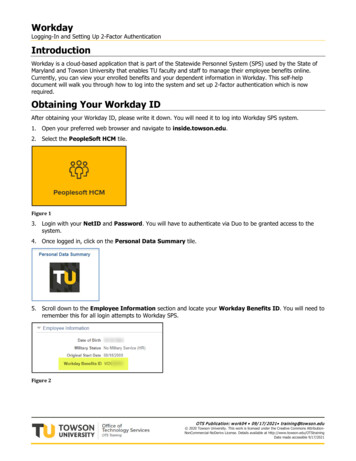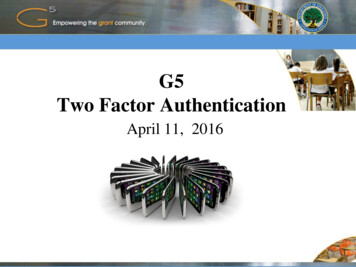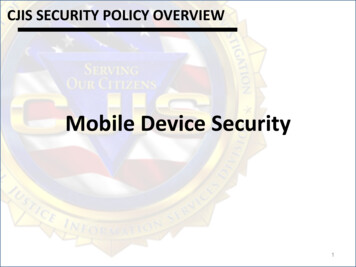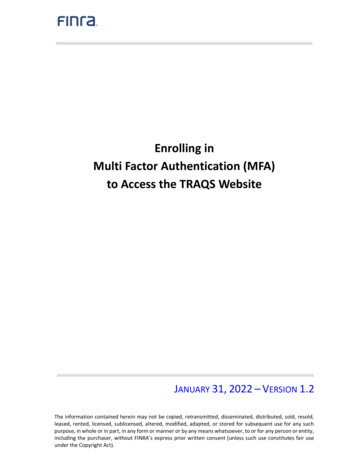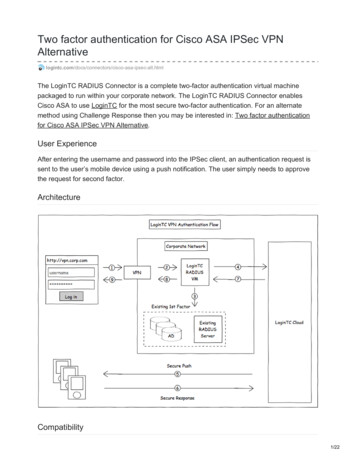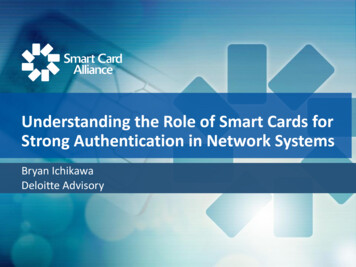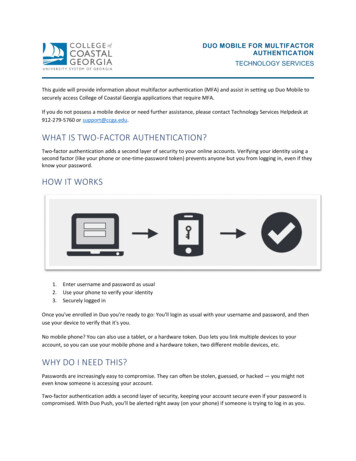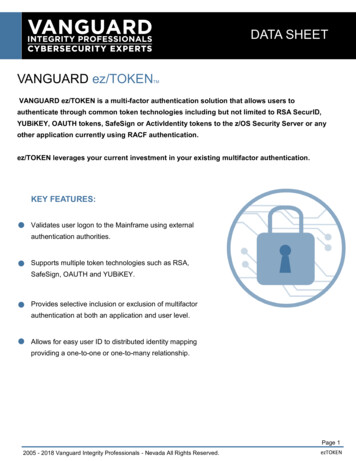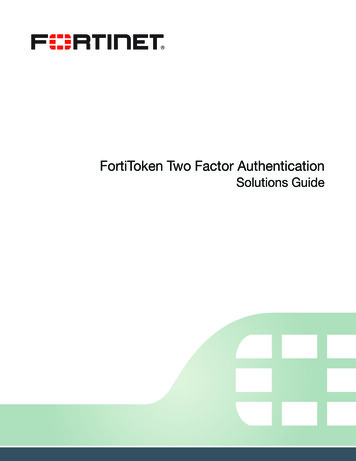
Transcription
FortiToken Two Factor AuthenticationSolutions Guide
Solutions GuideNovember 16, 201233-100-188900-20121116Copyright 2012 Fortinet, Inc. All rights reserved. Fortinet , FortiGate , and FortiGuard , areregistered trademarks of Fortinet, Inc., and other Fortinet names herein may also be trademarksof Fortinet. All other product or company names may be trademarks of their respective owners.Performance metrics contained herein were attained in internal lab tests under ideal conditions,and performance may vary. Network variables, different network environments and otherconditions may affect performance results. Nothing herein represents any binding commitmentby Fortinet, and Fortinet disclaims all warranties, whether express or implied, except to theextent Fortinet enters a binding written contract, signed by Fortinet’s General Counsel, with apurchaser that expressly warrants that the identified product will perform according to theperformance metrics herein. For absolute clarity, any such warranty will be limited toperformance in the same ideal conditions as in Fortinet’s internal lab tests. Fortinet disclaims infull any guarantees. Fortinet reserves the right to change, modify, transfer, or otherwise revisethis publication without notice, and the most current version of the publication shall beapplicable.Technical Documentationdocs.fortinet.comKnowledge Basekb.fortinet.comCustomer Service & Supportsupport.fortinet.comTraining comDocument Feedbacktechdocs@fortinet.com
Table of ContentsIntroduction. 2Motivation for strong authentication. 2Overview of two-factor authentication. 2Fortinet authentication server and token types . 3FortiGate . 3FortiAuthenticator . 3FortiToken solutions . 4Candidate applications for two-factor authentication . 5FortiToken Solutions Criteria . 5FortiToken deployment scenarios . 6FortiGate authentication server with FortiToken-200 and/or FortiToken Mobile 7FortiGate authentication server with FortiToken-200CD and/or FortiTokenMobile . 7FortiAuthenticator with FortiToken-200 and/or FortiToken Mobile . 8FortiAuthenticator with FortiToken 200CD and/or FortiToken Mobile. 9FortiGate authentication server with FortiToken-300 and FortiAuthenticatorCertificate Authority. 9Summary. 10Page 1
IntroductionThis guide covers various usage and deployment scenarios for Fortinet’s range of two-factorauthentication solutions.Motivation for strong authenticationVirtually all enterprise organizations do business online and keep sensitive date on networksaccessible from end-user devices. However, as witnessed by the many publicized breachesthat have occurred in the recent past, not all enterprises have been successful in protectingagainst such attacks.Remote access to network resources, including VPNs and web sites, are often protected onlywith simple user name and password credentials. This allows a determined hacker to gainaccess to these resources relatively easily. Further, weak internal security renders both wiredand wireless LANs vulnerable as we are seeing more attacks from within the perimeter.These trends have given rise to increasing mandates all around the world to comply withsecurity standards for assurance of networks, applications and data. The common denominatorfor securing user authentication is the addition of a second factor for validation of the user’sidentity; hence the term “two factor authentication” (2FA). Generally, in 2FA, the first factor issomething you know, for example, your password. Typically, the second factor is something youhave. That something is the security token.Overview of two-factor authenticationA security token is used as part of a system to prove one's identity electronically as aprerequisite for accessing network resources. There are many types of hardware and softwarebased tokens, sometimes referred to as dongles, key fobs, authentication tokens, USB tokensand cryptographic tokens. The use of a security token as the second factor by the end-usersolves the problems of using only static passwords.Token authentication solutions all require a client and server component. The client componentis the Security Token itself; the server component is the Authentication Server (also calledValidation Server). The two components share secret keys that are related to each other andused to independently perform cryptographic operations such that the outputs can becompared for validation purposes.Most enterprises contain diverse user communities with respect to their behaviors, risks andtechnical knowledge. Therefore, enterprises need strong authentication solutions that areflexible enough to secure online resources across a wide spectrum of environments. Yourchoice of solution can mean the difference between economically providing adequately highsecurity tools that can be easily adopted by your users, and paying too much for a solution thatleaves security holes and is too hard to use.Page 2
Fortinet authentication server and token typesFortinet’s 2FA solutions are cost-effective, highly secure and easy to administer and use. Oursolutions help organizations comply with SOX, PCI, HIPPA and other regulatory requirementsthat implicitly or explicitly require two-factor authentication. Organizations can chose thespecific type of security solution depending on the risk associated with various types oftransactions, and budgetary constraints, while providing reliable evidence of all network relateduser and administrative activities required for passing compliance audits.Fortinet security tokens, known as FortiToken, come in a variety of form factors and platforms.Specifically, the FortiToken product line includes: FortiToken-200 - Hardware device capable of generating time-based One Time Passwordvalues required on the client side. The token has neither a physical nor logical connection tothe client computer. It has a display to visually show the generated OTP authenticationcodes, which the user then enters manually along with login id and password via a keyboardor keypad. FortiToken-200CD - This is the same type of token as the FortiToken-200 but differs in themethod of server-side activation. FortiToken Mobile - Software implementation of the FortiToken-200 that can be installed ona Smartphone. FortiToken-300 - USB hardware device that must be physically connected to the clientcomputer to use for client certificate based authentication. It requires software to beinstalled on the host computer.All of the above listed tokens can be used for two-factor authentication. The FortiToken-300 canalso be used for other security purposes by virtue of its PKI certificate functionality (e.g.,encryption and signing).FortiToken is the client side equipment for strong authentication solution. There is also arequirement to deploy an authentication server on the back end. Here, Fortinet offers twoproduct options for authentication server: FortiGate and FortiAuthenticator.FortiGateThe FortiGate unit is generally specified as the authentication server in the case where a singleFortiGate unit is deployed for VPN. This would be for relatively small installations. The bigadvantage of using a FortiGate unit is that the Authentication Sever functionality is built-in; thereis no additional hardware or software to purchase resulting in significant cost saving. Tokens arespecific to each instance of the FortiGate unit. The FortiGate unit authentication also allows theintegration with existing AD/LDAP directory servers.FortiAuthenticatorFortiAuthenticator is generally specified as the authentication server in the case where multipleFortiGate units and other Radius client/NAS devices are deployed. FortiAuthenticator is a fullfunction stand-alone RADIUS Authentication server. Tokens can be used for anyVPN/Firewall/NAS RADIUS Client. FortiAuthenticator also includes native LDAP serverfunctionality as well as the ability to integrate with external LDAP directories. Further, the RESTAPI of FortiAuthenticator makes it possible to add two factor authentication to yournon-RADIUS based web applications. Finally, FortiAuthenticator has a user self service portalthat can minimize touch points in the provisioning process as well as Help Desk calls.Fortinet Technologies Inc.Page 3FortiToken Two Factor Authentication Solutions Guide
FortiToken solutionsFortinet’s strong authentication servers and clients provide strong, two-factor authentication forremote users on laptops, browsers, tablets and Smartphones solutions that are secure, easyand affordable.Fortinet offers a variety of security tokens in the FortiToken product line in addition to a choiceof Authentication Server platforms. They can be used to securely authenticate to a PC, Server,network, application or website. FortiToken solutions can be deployed for a single purpose,such as remote VPN access. A single token can also be used for multiple purposes, forexample, LAN login and VPN login.Fortinet solutions are standards based and will minimize IT labor and cost-of-ownershipthrough simple installation, tokens that don’t expire, end-user self-service, and out-of-the-boxintegration into your existing network infrastructure. They supports a flexible range of two-factorOATH compliant, time-based, OTP hardware tokens, soft tokens for mobile devices, SMS andemail options and client certificates.The benefits of Fortinet strong authentication for the enterprise include: Mitigating risk of weak, static password authentication, which is shown to lead to breaches,malware attacks, and policy violations. Low (zero) cost two-factor authentication options Increasing productivity with secure connections to data and applications from any locationthrough a variety of devices and authentication methods to suit the enterprise and theirusers. Ensuring compliance with regulatory standards Lowering costs associated with equipment, compliance, help desk calls, implementation,administration, and forced token replacement.Trusted by large and small businesses, governments, law enforcement and banks around theworld, Fortinet, with its strong authentication solutions for remote access, will provide thesecurity you need for your organization.The table below shows the possible combinations of Fortinet Authentication Servers andTokens that can be used to solve your two-factor authentication problem. Your specific criteriawill dictate the optimal choice for your environment.Table 1: Combinations of Fortinet authentication servers and tokens for two-factorauthenticationAuthentication ServerToken (Client)Certificate AuthorityFortiGateFortiToken-200/FortiToken MobileN/AFortiGateFortiToken-200CD/FortiToken en oken MobileN/AFortiGate or Third PartyFortiToken-300FortiAuthenticatorThe determination of the solution footprints above is based on the fact that FortiGate has abuilt-in authentication server function that comes standard with every FortiOS device and virtualPage 4
machine and FortiAuthenticator is an external authentication server. The authentication serverfor PKI certificate based solutions using FortiToken-300 depends on the application. Forexample, FortiGate VPN access would require FortiGate unit as the authentication server,whereas Windows smartcard login would require Windows server to perform the authentication.Candidate applications for two-factor authenticationThe table below shows a list of typical applications that should be secured using two-factorauthentication and indicates if an external Authentication Server is required to do so.Table 2: Deployment context for various applications using two-factor authenticationApplications UsingBuilt-In FortiGateAuthentication Server(note: these can alsobe configured to use anexternal authenticationserver)Network Access Servers (NAS),Applications Requiring ExternalRADIUS Authentication Server(FortiAuthenticator)Applications RequiringExternal AuthenticationServer(FortiAuthenticator) withAuthentication APICertificate BasedApplications NotRequiring ExternalAuthenticationServerFortinet deviceand appsThird party VPN(RADIUS clients)FortiGate SSL VPNFortiManagerAdmin loginCisco IOS based Web sitesswitches androutersVPNFortiGate IPsec VPNFortiMail AdminloginCisco ASAWindows SmartcardloginFortiGate Captive Portal FortiWeb Admin Citrix AccessloginGatewayFortiGate Admin loginLinux server withPAM moduleFortiDNS Admin loginApache withmod-auth-radiusmoduleHomegrown networkedapplicationsMicrosoft Outlookweb applicationFortiToken Solutions CriteriaAttack vectors are rising exponentially, with trends like BYOD and more endpoints of all typesconnected to the network. Strong authentication inside and outside the perimeter is absolutelyessential as part of a layered security best practice. But you need to work within your financialand technical resource constraints to deploy an effective solution that takes into accountoperational fit, administration, ease-of-use and budget.Some of the differentiating variables in the customer’s environment affecting the choice ofFortiToken strong authentication solution are: Size of end-user population: In general, if you have many end users that will be assignedtokens, you will want to centralize the token management in FortiAuthenticator. Both theFortiGate unit and FortiAuthenticator allow integration with existing AD/LDAP directories Number of FortiGate units that need to authenticate users: If your network consists ofonly FortiGate units and all you want is secure remote VPN access, you may want to use theFortiGate as your authentication server.Fortinet Technologies Inc.Page 5FortiToken Two Factor Authentication Solutions Guide
Fortinet non-RADIUS devices, third Party RADIUS devices and other Non-RADIUSclients/applications that need to authenticate users: FortiAuthenticator is requiredenabling two-factor authentication for non-FortiGate clients. Regulatory Compliance: Industry regulations will require you to comply with best practicesfor protecting access to resources and often specify two-factor authentication. BYOD Policy: If your policy allows end-users Smartphones for business applications,whether company issued or BYOD, you may consider using the FortiToken Mobile as analternative to hard tokens. Multiple tokens per end users: If you want to assign separate tokens for access to varioussystems, you don’t want to require your end-users to carry additional hardware. Mobileapps, such as FortiToken Mobile, allow users to install multiple tokens on the same device.FortiToken deployment scenariosThis section describes FortiToken solution alternatives relative to the variables in the customer’senvironment. Table 2 below shows the FortiToken solution for various characteristics of thecustomer environment in which it will be deployed.Table 3: Solution footprint deployment criteriaFortinet Solution rtiGate plusFortiToken-200and/or FortiTokenMobileFortiAuthenticatorFortiGate plusFortiToken-200CDand/or 00and/or FortiTokenMobileFortiAuthenticator -300plusFortiAuthenticator(CA)SmallSmall, MediumLargemedium, LargeAnyNumber of FortiGatedevices (or HA clusters)that need toauthenticate usersOneFewAnyAnyAnyNeed to authenticateusers to third partydevices, applicationsand/or web sitesNoNoYesYesYesRegulatory compliancerequiredYesYesYesYesYesAllowed (forFortiToken MobileAllowed (forFortiToken MobileAllowed (forFortiToken MobileAllowed (forFortiTokenMobileN/AYes (withFortiTokenMobile)YesSize of end userpopulationBYOD policesAll or some usersrequire multiplecredentials/tokensYes (withYes (withYes (withFortiToken Mobile) FortiToken Mobile) FortiToken Mobile)The remainder of this section provides more detailed context for each of the types of FortiTokensolutions.Fortinet Technologies Inc.Page 6FortiToken Two Factor Authentication Solutions Guide
FortiGate authentication server with FortiToken-200 and/or FortiToken MobileThe simplest, most cost-effective solution for securing FortiGate VPN (SSL or IPSec) access isto use the FortiGate unit as the authentication Server. Because the FortiGate unit is used as theVPN Server as well as the authentication server, there is no need to deploy FortiAuthenticator orany other external authentication server in the solution. The end users can all be provisionedwith hard tokens. If BYOD policy allows end users to use their own Smartphones, or if theorganization issues Smartphones, they can be provisioned with FortiToken Mobile tokens.FortiToken Mobile tokens also enable users to carry multiple tokens all on the same device.This solution has tremendous advantage from an administrative and cost perspective if youhave only a single FortiGate cluster that you are using to authenticate VPN users. There is noneed to deploy another hardware or virtual appliance to perform and manage authentication.The whole operation is already centralized in your FortiGate unit, with no additional licensing orsupport costs.Not only can FortiToken be used to secure administrative access to the FortiGate unit, it alsocan be used to enable two-factor authentication for FortiGate IPSec VPN, SSL VPN and captiveportal users, thereby increasing the ROI even further.For security reasons, it is generally not recommended to install the same FortiToken-200 tokenson multiple FortiGate units. Therefore, by default FortiToken-200 can only be activated onceonline via the FortiGuard hosted token activation server.Figure 1: FortiToken Authentication with FortiGateFortiGate authentication server with FortiToken-200CD and/or FortiToken MobileAlthough Fortinet recommends the use of FortiAuthenticator to centralize the management ofthe tokens and eliminate the administrative overhead of tending to tokens across multipleFortiGate units, there are cases where FortiAuthenticator is not practical or necessary. Thiscould be because of capital expense budget limitations. Or it could be the case that you are anMSSP and you want your staff members to have one hard token to use to get administrativeaccess to all the FortiGate units used to provide security services to your clients. In this case, itmight make sense to use this solution so you can install the same token but with a different userid across multiple FortiGate units.Fortinet Technologies Inc.Page 7FortiToken Two Factor Authentication Solutions Guide
If you want to install the same instance of FortiToken on multiple FortiGate units or FortiGate HAclusters using the built-in FortiGate authentication server to authenticate users, then you shoulduse the FortiToken-200CD tokens. However, care must be taken to make sure that the user andtoken configurations are consistent across the FortiGate units. If you are setting up so that agiven user can use his/her token to authenticate on multiple FortiGate units, then you mustmake sure that changes made on one FortiGate with respect to token configuration are in syncand compatible with the other FortiGate devices.The FortiToken-200 by default has a one-time activation limit via the secure Fortinetcloud-based seed server so that it can be activated and installed on only one FortiGate unit.However, because the FortiToken-200CD activation file is encrypted and in your control, youcan securely activate the tokens repeatedly across multiple FortiGate devices without worry.Therefore, the FortiToken-200CD solution applies to environments where separate FortiGateunits are deployed with no centralized authentication server, and users must have two-factorauthentication access to each FortiGate unit. Another reason to use FortiToken-200CD is if youhave any concern or network limitation that would prevent you from using Fortinet’s FortiGuardto activate your tokens.If your BYOD policy allows end users to use their own Smartphones, or if the organizationissues Smartphones, they can be provisioned with FortiToken Mobile tokens. FortiToken Mobiletokens also enable users to carry multiple tokens all on the same device.FortiAuthenticator with FortiToken-200 and/or FortiToken MobileFortiAuthenticator should be used as the centralized authentication server where there aremultiple FortiGate units and/or other authentication clients. This includes heterogeneousenvironments consisting of multiple third party Network Access Servers (NAS), RADIUS-basedVPN devices and applications, homegrown applications and web sites.Any RADIUS-based client can be easily integrated with FortiAuthenticator, virtually out of thebox. Nearly every VPN server available on the market supports RADIUS, including Cisco,Checkpoint, Juniper, SonicWall and Microsoft RRAS. Many other commercial products such asCitrix Access Gateway, Oracle and Microsoft IAS include RADIUS client functionality for simpleintegration with a RADIUS server such as FortiAuthenticator.Non-RADIUS clients can also be easily integrated using the available Representational StateTransfer (REST) API. Use this API to allow your applications to make authentication calls toFortiAuthenticator over the HTTPS protocol. This allows you to securely integrate anyweb-based or networked application into an authentication client of FortiAuthenticator.For deployment environments involving a large number of end users who are going to beassigned tokens, FortiAuthenticator simplifies the management of the tokens as well ascentralizes the validation function thereby eliminating the need to manually synchronize userdata across multiple authentication servers.FortiAuthenticator also offers an end-user portal for self-service registration and authenticationmanagement functions, such as password reset. You can further increase your return oninvestment (ROI) on FortiAuthenticator by using its native Certificate management, 802.1X PortNetwork Access Control, and FSSO support. These functions are included in theFortiAuthenticator at no additional licensing or support cost.If your BYOD policy allows end users to use their own Smartphones, or if the organizationissues Smartphones, they can be provisioned with FortiToken Mobile tokens. FortiToken Mobiletokens also enable users to carry multiple tokens all on the same device.Fortinet Technologies Inc.Page 8FortiToken Two Factor Authentication Solutions Guide
Figure 2: FortiToken Authentication with FortiAuthenticatorFortiAuthenticator with FortiToken 200CD and/or FortiToken MobileThe criteria for using this solution footprint are the same as for the case above, except wherethere is a concern or policy against using a vendor that stores the token seeds in an onlinedatabase. The FortiToken-200CD does not use an online seed store for activation; everythingyou need to install and activate the tokens is included in an encrypted file on a CD shipped in atamper-evident package. The FortiToken Mobile activation is done dynamically through theFortinet cloud and the seeds are deleted from the cloud as soon as they are installed on the enduser’s device.If your BYOD policy allows end users to use their own Smartphones, or if the organizationissues Smartphones, they can be provisioned with FortiToken Mobile tokens. FortiToken Mobiletokens also enable users to carry multiple tokens all on the same device.FortiGate authentication server with FortiToken-300 and FortiAuthenticatorCertificate AuthorityThe choice of PKI technology depends on the perceived threat on the resources you want toprotect. Networks containing data that are bound to strict regulatory compliance, such asgovernment entities, are the primary candidates for PKI-based two-factor authenticationsolutions.For organizations that need to be absolutely sure of a user’s identity, where the threat risk isquite high, when the damage from a security breach is great, or when the access credentials areshared between multiple applications (federated identity), PKI solutions make sense.Fortinet’s enterprise access solution is designed to help an organization’s security andcompliance objectives at a higher ROI by providing end users with a single, secure credentialfor remote access to networks and websites, as well as LAN access and login to a PC. Thissolution can also be used to digitally sign and encrypt email and documents, thereby furtherincreasing ROI. For example, with a single token credential, an end user can be enabled fortwo-factor authentication access to corporate VPN, Windows domain login and MicrosoftOutlook Web Access. Further the same token can be used to store user certificates for digitalsigning and encryption of documents and emails.Many web-based applications are already PKI enabled, while other’s support federated loginthat can be enabled for PKI certificates. USB Smartcards for PKI certificates can be used forstronger authentication into VPN, Windows desktops, laptops and servers. Besides theFortinet Technologies Inc.Page 9FortiToken Two Factor Authentication Solutions Guide
advantage of effectively defending against insiders, USB Smartcards themselves are highlysecure in that the private keys stored in the hardware cannot be exported or otherwiseextracted.PKI certificate deployment has traditionally been difficult and expensive. Fortinet makes it mucheasier and more cost-effective through the introduction of FortiAuthenticator, which can beused in conjunction with the FortiToken-300 USB Smartcard to deploy a simple, turnkey, singlevendor solution that enables enterprises turn up a scalable PKI infrastructure and issuecertificates to end users in short order. The benefits of the Fortinet PKI Smartcard solution are: Reduced risk of network attacks, compliance issues and financial liabilities withstandards-based, “government” strong authentication Increased productivity and adoption with convenient and simple user experience Enhanced ROI with one universal client certificate for more efficient certificate management,and faster deployment of authenticating networks and apps.Figure 3: Authentication with FortiToken-300SummaryTwo factor authentication is necessary today to protect your network. There are many choicesin vendors and technologies to solve your two-factor authentication problem. Fortinet, theleader in network security, brings you a wide spectrum of choices in client and servercomponents to tailor a solution for your unique needs. With solutions from zero cost serverfunction to hardware and mobile tokens supporting third party systems, Fortinet has a solutionto suit any requirement and budget.Fortinet Technologies Inc.Page 10FortiToken Two Factor Authentication Solutions Guide
Fortinet's strong authentication servers and clients provide strong, two-factor authentication for remote users on laptops, browsers, tablets and Smartphones solutions that are secure, easy and affordable. Fortinet offers a variety of security tokens in the FortiToken product line in addition to a choice of Authentication Server platforms.
